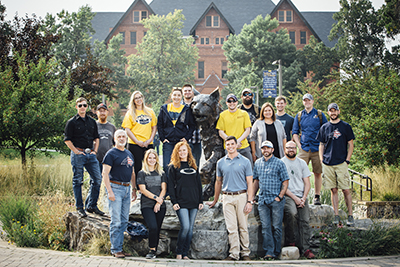Mountains & Minds: Learners and Leaders
Access
Land-grant universities were established by Congress in 1862 with the explicit intent to educate the sons and daughters of the industrial classes. MSU continues to fulfill that intent, believing that education serves society as a whole through job creation, stronger civic participation, and a reduction in the societal costs borne by a less educated populace. MSU does not turn away qualified Montanans and will continue to provide access to a quality education for all students to improve the state and the well-being of its citizens.

Goal:
Montana State University is committed to widening access to higher education and ensuring equality of opportunity for all.
Providing access to higher education for a larger and more diverse population was the goal of the 1862 act that established land-grant universities. Today, broadening access to MSU means new opportunities for students from different places, representing different backgrounds and learning in different ways. Not only do individual students, who might not otherwise have educational opportunities, benefit when access is widened, but all students benefit from exposure to diversity of experiences and ideas. Numerous studies demonstrate that a diverse student body leads to important educational benefits such as the reduction of prejudice; growth in cognitive abilities, critical thinking skills and self-confidence; the promotion of civic engagement and skills needed for professional development and leadership; and improved curricula and classroom environments (American Educational Research Association).
MSU has made great strides in its ability to meet the educational needs of any qualified Montanan with the desire to pursue further education. Through the addition of new two-year and four-year degree programs and certifications, technologies that enable both synchronous and asynchronous learning for place-bound students, innovative course offerings that address contemporary demands, and increased financial aid coupled with low tuition, MSU has been able to open new doors for students.
MSU must continue to expand educational opportunities while protecting the excellent quality of education for which MSU is known. This goal couples enrollment growth across all sectors with targeted efforts to increase diversity for the benefit of all students.
Evidence:
MSU welcomes and nurtures students from across the state and around the globe:
- Montana State University set a new enrollment record in 2018, marking 11 straight years of enrollment growth for the Bozeman campus.
- MSU’s number of American Indian and Alaska Native students also increased to 776, a jump of 9 percent and a new record. Increasing Native American enrollment and access to higher education is one of the goals in MSU’s strategic plan.
- In 2012, MSU launched an online bachelor’s degree completion program for students who have completed two years of college credits. Allowing students to complete degrees from anywhere in the world, the program offers a flexible, multi-disciplinary education appropriate for a variety of careers.
- The university awarded a record 3,232 degrees during the 2017-2018 academic year, including 91 doctorates, 2,396 bachelor’s degrees and 104 associate’s degrees. Expanding the scale, breadth and quality of doctoral education and the number of associate’s degrees awarded are two of MSU’s strategic goals.
